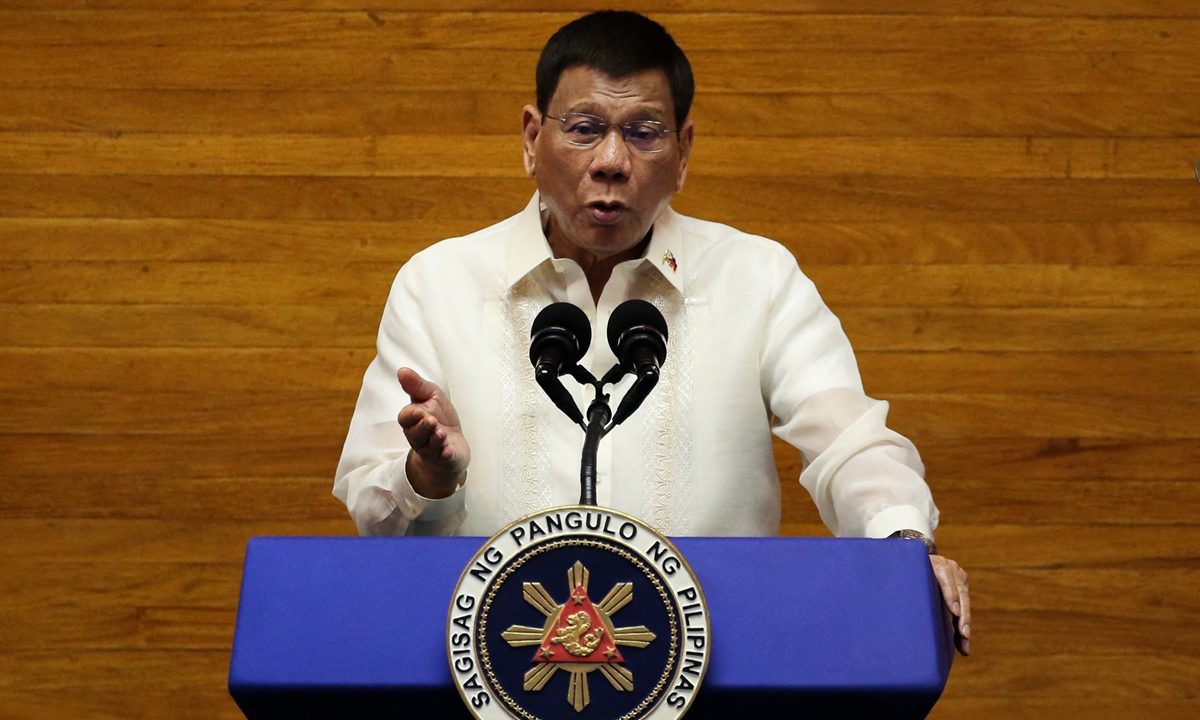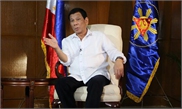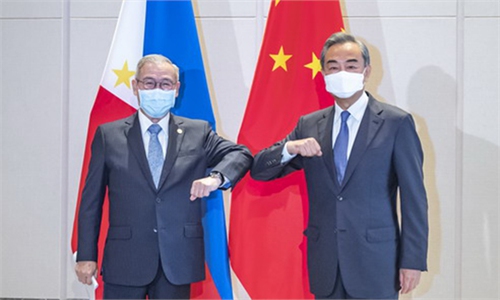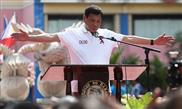
Philippine President Rodrigo Duterte speaks during the annual state of the nation address at the House of Representatives in Manila on Monday. Photo: AFP
Philippine President Rodrigo Duterte delivered his final State of the Nation Address on Monday. He reiterated his stance that he would never order his troops to launch a war against China. Duterte's narrative on "war" embodies his sobriety: The losses from clashes with China outweigh any possible gains.Some domestic opinion in the Philippines, especially from the opposition, is not sober in this regard. Under instigations of some Western media outlets, some politicians and opinion-makers within the Philippines have urged the Philippine government to confront China especially when it comes to the South China Sea issue. Those people have clearly not thought over the consequences of confrontations. Duterte's repeated emphasis on no war with China is to persuade those people that are influenced by the West.
There has been some rhetoric saying that Duterte's tilt toward China has been a failure. As the 2022 Philippine presidential election approaches, related political forces are sparing no efforts to win support. Making such noise against China is one of the ways to gain votes. But Duterte mentioned on Monday that, "We will not close our doors on diplomacy… Because that is how disputes are settled, and never by force." Duterte's words display his rational manner toward China-Philippine relations.
As US Defense Secretary Austin is about to visit the Philippines, Duterte's remarks can also be regarded as a message to Washington: Although Manila will still stick to its alliance with the US, it will not change its course and policy just because the Biden administration took office or that Austin is visiting. At least for the duration of the Duterte administration, Manila will remain committed to a balanced foreign policy of great power and will work with Beijing to resolve all differences, including sovereignty disputes through open dialogues.
Moreover, the Philippines has suspended a decision to scrap the Visiting Forces Agreement (VFA). The agreement is also expected to be on the agenda during Austin's visit.
The Philippines proposed to end the agreement because the Duterte administration wanted to express its dissatisfaction with visa restrictions imposed by the US on Philippine politicians over human rights issues. In addition, the Duterte government may hope to use the VFA as a bargaining chip to win the Philippines a more equal status and more interests in its ties with the US.
After all, the VFA is a very important foundation of the US-Philippines alliance. The odds are that the deal will be kept.
Although Duterte has adopted a China-friendly policy or pro-China policy as some call it, this does not mean that he will abandon the alliance with the US as the alliance with the US has been a cornerstone of the Philippines' foreign policy. The policy of the Duterte government is to achieve a balance between great powers. When he moves closer to China, he expresses his dissatisfaction with the US and even makes some criticisms. But some major arrangements with the US will still be maintained.
During his final State of the Nation Address, Duterte responded to criticisms leveled on some of his policies. He also expressed his hope that proposed measures in the remaining time of his term could get the support of the Congress. Will the Philippines change the balance it has stricken between China and the US after Duterte? This will depend upon what kind of a new leader the Philippines will have in the future.
If the successor could continue Duterte's stance, it will be highly likely Duterte's balanced diplomacy will be inherited. But if the opposition, especially the Liberal Party, assumes office, Manila's China policy will likely see a major change and return to a confrontational stance against Beijing. A third possibility cannot be ruled out: a neutral stance that will emphasize Philippine nationalism may appear between Duterte's China-friendly policy and the extreme anti-China policies supported by the oppositions, including the Liberal Party.
With the approach of the 2022 presidential elections, various political forces will hype up China-related issues. This might mean bilateral relations between Beijing and Manila may witness some ups and downs. This deserves our close attention.
The author is research fellow and deputy director at the Institute of International Relations of the Shanghai Academy of Social Sciences. opinion@globaltimes.com.cn



